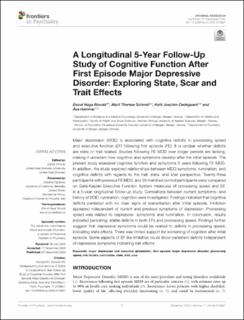| dc.contributor.author | Ronold, Eivind Haga | |
| dc.contributor.author | Schmid, Marit Therese | |
| dc.contributor.author | Ødegaard, Ketil Joachim | |
| dc.contributor.author | Hammar, Åsa | |
| dc.date.accessioned | 2021-02-26T11:29:14Z | |
| dc.date.available | 2021-02-26T11:29:14Z | |
| dc.date.created | 2021-01-04T20:34:38Z | |
| dc.date.issued | 2020 | |
| dc.Published | Frontiers in Psychiatry. 2020, 11:575867 1-12. | |
| dc.identifier.issn | 1664-0640 | |
| dc.identifier.uri | https://hdl.handle.net/11250/2730631 | |
| dc.description.abstract | Major depression (MDD) is associated with cognitive deficits in processing speed and executive function (EF) following first episode (FE). It is unclear whether deficits are state or trait related. Studies following FE MDD over longer periods are lacking, making it uncertain how cognition and symptoms develop after the initial episode. The present study assessed cognitive function and symptoms 5 years following FE MDD. In addition, the study explored relationships between MDD symptoms, rumination, and cognitive deficits with regards to the trait, state, and scar perspective. Twenty-three participants with previous FE MDD, and 20 matched control participants were compared on Delis-Kaplan Executive Function System measures of processing speed and EF, in a 5-year longitudinal follow-up study. Correlations between current symptoms- and history of MDD, rumination, cognition were investigated. Findings indicated that cognitive deficits persisted with no clear signs of exacerbation after initial episode. Inhibition appeared independent of current and previous symptoms of depression. Processing speed was related to depressive- symptoms and rumination. In conclusion, results indicated persisting, stable deficits in both EFs and processing speed. Findings further suggest that depressive symptoms could be related to deficits in processing speed, indicating state effects. There was limited support for worsening of cognition after initial episode. Some aspects of EF like Inhibition could show persistent deficits independent of depressive symptoms indicating trait effects. | en_US |
| dc.language.iso | eng | en_US |
| dc.publisher | Frontiers Media | en_US |
| dc.rights | Navngivelse 4.0 Internasjonal | * |
| dc.rights.uri | http://creativecommons.org/licenses/by/4.0/deed.no | * |
| dc.title | A longitudinal 5-year follow-up study of cognitive function after first episode major depressive disorder: Exploring state, scar and trait effects | en_US |
| dc.type | Journal article | en_US |
| dc.type | Peer reviewed | en_US |
| dc.description.version | publishedVersion | en_US |
| dc.rights.holder | Copyright © 2020 Ronold, Schmid, Oedegaard and Hammar. | en_US |
| dc.source.articlenumber | 575867 | en_US |
| cristin.ispublished | true | |
| cristin.fulltext | original | |
| cristin.qualitycode | 1 | |
| dc.identifier.doi | 10.3389/fpsyt.2020.575867 | |
| dc.identifier.cristin | 1865218 | |
| dc.source.journal | Frontiers in Psychiatry | en_US |
| dc.source.40 | 11:575867 | |
| dc.identifier.citation | Frontiers in Psychiatry. 2020, 11, 575867. | en_US |
| dc.source.volume | 11 | en_US |

